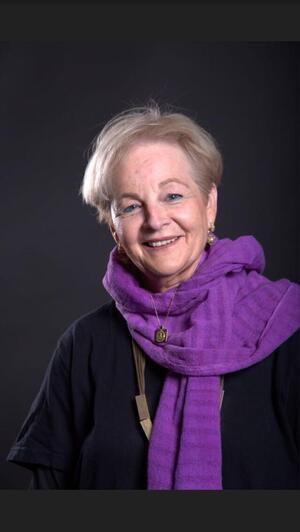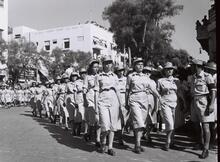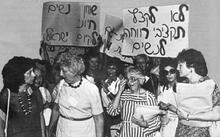Amira Dotan
Amira Dotan served in the Israel Defense Forces for seventeen years, fulfilling various functions of management, command, and logistics before being promoted to commanding officer of the Women’s Corps in 1982. She was the first Women’s Corps commanding officer to be accorded the rank of brigadier general. Upon her appointment to head the Women’s Corps, Dotan enlisted a number of prominent feminist academics and public figures, including male reserve officers, to serve as advisors and advocates in order to enhance women’s contributions to the IDF. Following her retirement from the IDF, she held various positions such as vice president of Ben Gurion University, head of the Jewish Agency’s operations, and founder of a mediation center.
Family
The first OC Women’s Corps to be accorded the rank of brigadier general, Amira Dotan (née Mosseri), was born in Tel Aviv on July 28, 1947. Her father, Moshe Mosseri, who was born in the Old City of Jerusalem in 1920, was among the settlers of the Neve Zedek quarter in Tel Aviv. A member of the Haganah, he served as a supernumerary police officer and was a founding member of the Ha-Ma’avir bus cooperative. Her mother, Malka (née Raus, b. Tel Aviv, 1927), studied at the Talpiot Teachers Seminary and became a kindergarten teacher. Amira was the oldest of three children, the others being her sister Nurit (b. 1951) and her brother Rahamim (Rami, b. 1955).
Women’s Corps
Prior to her promotion to commanding officer of the Women’s Corps in 1982, Amira Dotan had served in the IDF for seventeen years, fulfilling various functions of management, command, and logistics. During that time she had held the position of OC Women’s Corps of the Southern Command and that of deputy commanding officer of the Women’s Corps. Upon her appointment to head the Women’s Corps, Dotan enlisted a number of prominent feminist academics and public figures, including male reserve officers, to serve as advisors and advocates. With their support and with the encouragement of Moshe Levy, the chief of staff at the time, Dotan succeeded in enhancing women’s contribution to the IDF with empowerment courses, laying stress on how this would influence their success in civilian life. These factors made it possible for her to press for the integration of servicewomen into all branches and occupations in the IDF, while at the same time acknowledging the psychological, physiological, and other differences between the sexes.
During the war in Lebanon (1982–1985), the headquarters of the Women’s Corps for the first time established a method of determining which servicewomen would be deployed beyond the Green Line, specifying the criteria to be applied in selecting them. Detailed regulations made it obligatory on the part of commanding officers to state the reasons for rejecting the women. (These rules laid the ground for the case brought by Alice Miller against the Air Force, when the latter rejected her request to enter pilot training because she was a woman.) Women were thus integrated into the military police, communications, intelligence, etc. While Dotan occupied the position of OC Women’s Corps (1982–1987), pre-army courses grew in importance, designed to compensate for women’s shorter compulsory service and thus enable them to integrate into a wider range of occupations, including electronics and computer science. Religiously observant women were enabled to serve meaningfully in the IDF in a manner appropriate to their religious beliefs and practices. Additional positions opened to women included those of operations officer, NCOs trained for service in time of chemical or biological warfare, sapper training, and so forth.
All the reforms furthered by Dotan and their significant impact on the image and perception of the Women’s Corps, both in the women’s eyes and in those of their male colleagues and commanders, led in 1986 to her promotion from the rank of colonel to brigadier general. Although at first this rank was offered to Dotan as a “personal” promotion, she refused to accept it, if it did not apply to her successors. It has since become the customary rank for the OC Women’s Corps.
Post-IDF Career
At the time of her appointment as OC Women’s Corps, Amira Dotan was thirty-five years old, married since 1968 to Yonatan Dotan (1942–1995) and the mother of two daughters and a son—Inbar (b. 1970), Innon (b. 1972) and Anat (b. 1977). She attained a BA degree in behavioral sciences in 1971 and took courses towards an MA in psychology in 1982, both at the Ben-Gurion University of the Negev in Beersheba, where she lived for twenty years. Following her retirement from the IDF in 1987 she became vice president of Ben-Gurion University. In 1988 she was appointed to head both the Jewish Agency’s operations and the Zionist Mission in North America, remaining in that position until 1992. Returning to Israel, she became the director of Operation Independence, a non-governmental business network between Israel and North America. In 1998 she established her own mediation center, “Gishur Neve Zedek,” located in the Tel Aviv quarter in which her father had once settled.
Active in the Masorti (Conservative) movement, she served for some years as chair of the Israel board of the Schechter Institute of Jewish Studies in Jerusalem. She initiated a forum of career women in the Middle East and served on the boards of numerous public bodies, including the New Fund for Israel Cinema and Television, Israel Aircraft Industries and Ben-Gurion University.
In January 2006 Dotan joined the newly-formed Kadima party, at the request of its leader Ariel Sharon, and was placed twenty-eighth on the party’s list of candidates for the Lit. "assembly." The 120-member parliament of the State of Israel.Knesset elections of that year.
On April 6, 2008, Amira Dotan was honored at the Cherry Hill synagogue Sons of Israel synagogue in Cherry Hill, New Jersey, in honor of Israel’s 60th birthday, where she discussed the State’s security, military actions in Gaza, and talks between Israel and the Palestinian Authority.






